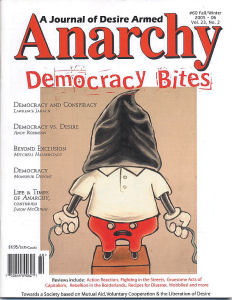ANARCHY: A Journal of Desire Armed

A caveat: I fell in love with the title of this publication before I ever saw a copy or knew what it was about. It's Anarchy: A Journal of Desire Armed, a twice-a-year magazine from the C.A.L. Press, a collective in Berkeley, CA, about the social and political philosophy called "anarchism" or "anarchy" (more about that distinction later). This is issue #60 of the publication, which had its beginnings in Columbia, MO about 1980, moved to New York briefly and disastrously in 1995, then back to Missouri, and just recently was transferred to the West Coast.
I have no idea where the "desire armed" tag comes from―Prince Kropotkin's writings in the late 19th century would be my guess if it was a question on Jeopardy—but I have learned something about this interesting movement from scanning the Fall-Winter issue that's arrived in the MagSampler.com newsstand.
A lifesaver in the issue is a three-page column by Bob Black titled "Anarchy 101." He starts it off with a definition: "Anarchism is the idea that government (the state) is unnecessary and harmful. Anarchy is society without government. Anarchists are people who believe in anarchism and desire to live in anarchy as all our ancestors once did. People who believe in government (such as liberals, conservatives, socialists and fascists) are known as 'statists.'"
Black then poses the question that's probably on your mind: "Aren't anarchists bomb-throwers?" I liked his snappy reply: "No―at least not compared to, say the United States Government, which drops more bombs every day on Iraq than anarchists have thrown in the almost 150 years they have been a political movement. Why do we never hear of 'bomb-throwing Presidents'? Does it matter if bombs are delivered horizontally by anarchists rather than vertically by the US Government?"
Black goes on to admit that unalloyed anarchy is not an achievable goal today, but its basic principles―such as voluntary cooperation among people, observable in early human society―can be implemented in many ways at many levels. One last quote from his column, this one in answer to the question, "How can you trust people not to victimize each other without the state to control crime?" The answer, also mind-bendingly logical: "If you can't trust ordinary people not to victimize each other, how can you trust the state not to victimize us all? Are the people who get into power so unselfish, so dedicated, so superior to the ones they rule? The more you distrust your fellow man, the more reason there is to become an anarchist. Under anarchy, power is reduced and spread around. Everybody has some, but nobody has very much. Under the state, power is concentrated, and most people have none, really. What kind of power would you like to go up against?"
This issue of Anarchy, 82 pages plus cover, is ad-free and full of well-reasoned essays on evolving anarchist thought, reports on anarchist organizations in Europe (they tend to be better organized (!!) and active than their American counterparts, and as a result seem to be in courtrooms and prisons a lot), book reviews and contentious letters to the editor. The anarchist community in the United States seems a lively and erudite bunch, not tied down to any party line and energetic in applying anarchist ideas to questions of feminism, culture, education, ecology and everything else. The community is a small one: the magazine proclaims in its masthead that the press run for the issue is a mere 6,200.
A note on the distinction between the terms "anarchy" and "anarchism." In a corner of the magazine's Web site is this interesting snippet, reflective of the preoccupation of many of the publication's writers with terminology with getting away from traditional ideologies: "Post-left anarchy is a recent current in anarchist thought that seeks to distance itself from the traditional Left (communism, social liberalism, social democracy etc.) and to escape the confines of ideology in general. It has rapidly developed since the fall of the Soviet Union, which many view as the death of authoritarian leftism; however, its roots are clearly visible in the ideas of the 1960s Situationists. It is not an independent 'movement' as such but rather a critical way of thinking about anarchist ideas. Post-leftists frequently use the word 'anarchy' instead of 'anarchism' to avoid the '-ism' suffix's connotation of a doctrine."
Whatever your own political leanings, I think you'll find Anarchy: A Journal of Desire Armed a good wash and rinse for the head. You'll come away from it with a new perspective on humanity's organizational principles and problems. A two-year subscription (four issues) is $16.00 from the publisher; we'll send you a sample copy for $2.59.


0 Comments:
Post a Comment
<< Home